Download
News 2012/19
Brian
Wilson
Please note that from this article forward,
these musings on downloads of recent and older recordings will
be renamed and renumbered. I hope still to produce them at approximately
fortnightly intervals, but without the rigid necessity of meeting
deadlines at the beginning and middle of the month. As there
have been 18 bi-monthly roundups so far, then, this becomes
Download News 2012/19. The previous Roundup, September 2012/2
is here.
My apologies to Naxos and the Oxford Camerata whose 1995 recording
of the music of Willaert (8.553211 � download from classicsonline.com
or stream from Naxos Music Library) I left out of consideration
in the previous Roundup when I wrote that there was only one
recording wholly of his music in the catalogue beside the new
Ricercar. My thanks to Nick Flower of Hyperion for pointing
this out.
Download
of the Month
Kalevi AHO (b. 1949)
Three Interludes for Organ (1993) [17:45]
Alles Vergängliche, Symphony for Organ (2007) [51:38]
Jan Lehtola (1907/2008 Åkerman & Lund organ)
rec. October 2010, St Johannes kyrka, Malmö, Sweden
Pdf booklet included
BIS-SACD-1948 [70:12] � from eclassical.com
(mp3, 16� & 24-bit lossless)
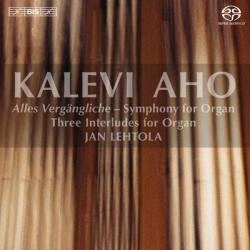 I’ve
listened to this only once, from Naxos Music Library, but I’m
happy to follow Dan Morgan’s suggestion and make it Download
of the Month; here are his thoughts on it:
I’ve
listened to this only once, from Naxos Music Library, but I’m
happy to follow Dan Morgan’s suggestion and make it Download
of the Month; here are his thoughts on it:
I’ve said it before, and I’ll say it again; BIS’s
unfolding Aho series is one of the most significant � and most
rewarding � artistic collaborations around. Each release not
only offers premiere recordings of new music but also gives
us a glimpse into the evolving soundscapes of an important,
living composer. The forces employed in this cycle are impressive
too, and recruiting Jan Lehtola for these organ works is a real
coup. This Finnish organist � one of a distinguished breed that
includes Kalevi Kiviniemi, Santeri Siimes and Ville Urponen
� can be heard to great advantage in this set of Mendelssohn
sonatas (review).
Alba’s superlative recording helps to make it a very desirable
issue indeed.
What a shame Alba’s and Fuga’s class-leading organ
SACDs aren’t available as high-res downloads � not yet
anyway � for they are very special. Their unfailing musicality
and sense of presence is astonishing, which makes them a hard
act to follow. Dipping into the latest Aho download it soon
becomes clear this is exceptional too, although listeners accustomed
to the composer’s orchestral music may find these organ
pieces a bit daunting at first. The three interludes, rigorously
conceived and unerringly played, may seem a tad Messiaenic at
times; that said, Aho’s ‘voice’ is always distinctive.
As for the third interlude, it brings out the contrasting sides
of this composer’s musical persona, combining as it does
stern formality and a tender, melting inwardness.
The quiet, shimmering sound-world of that interlude is superbly
wrought and recorded; it brings goose-bumps aplenty, I assure
you, and it reminds one of just how versatile � and imaginative
� Aho’s musical thinking tends to be. In his succinct liner-notes
he admits the Organ Symphony is a challenge for organist and
listeners alike; it’s a long piece, whose ‘density
of specification’ is breathtaking. The title, taken from
Goethe’s Faust, always brings Mahler’s Eighth
to mind; this opus for organ is just as universe-embracing,
from the subtle rhythmic palpitations and ear-catching colours
of the fantasia through to the mercurial moments of the first
fugue and the dark dissembling of the second.
I’ve not heard this multi-faceted modern instrument before,
and I’m hugely impressed by its near-perfect blend of refinement
and scale. If that leaves you dumbstruck then Lehtola’s
sure-footedness � notably in those big, celestial climaxes �
will leave you cowering in your pew. At the symphony’s
core lies a glowing, largely contemplative adagio that
conjures up the most radiant organ sounds imaginable. This really
is writing � and playing � of the highest order, and BIS have
done an astounding job at capturing it all for posterity.
Quite possibly one of my recordings of the year; don’t
miss.
Dan Morgan
http://twitter.com/mahlerei
Discovery
of the Month
David DUBERY (b.1948) Songs
and Chamber music
Sonatina for oboe and piano (Threesome for 2 players) (1986)
[6:34]
Three Songs to Poems by Robert Graves (for mezzo, recorder and
piano (2001) [4:31]
Four Songs for mezzo and piano (1971-1985) [8:34]
Suite from Degrees of Evidence for recorder, oboe and
viola (2004) [7:38]
Remember for voice and piano (2005) [3:11]
Two Stopfordian Impressions for recorder and piano (2008-2009)
[6:08]
Sonata for cello and piano (2006) [11:22]
Escapades for recorder, bassoon and piano (2008-2009)
[10:13]
Walking Cimbrone for bassoon and piano (2007) [3:43]
Harlequinade for recorder and guitar (2007) [12:35]
Mrs Harris in Paris (Valse Temptation) for treble
recorder and piano (2003) [3:45]
Adrienne Murray (mezzo), John Turner (recorder), Peter Dixon
(cello), Richard Simpson (oboe), Graham Salvage (bassoon), Craig
Ogden (guitar), Richard Williamson (viola), David Dubery (piano),
Paul Janes (piano) � rec. 2008 and 2009. DDD.
DIVINE ART METIER MSV28523 [78:47] � from theclassicalshop.net
(mp3 and lossless)
[see detailed review
by John France]
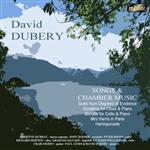
Sometimes I’m a bit slow to cotton on to the discoveries
that my colleagues have made; in this case it’s more than
a year since John France alerted us to ‘a great retrospective
CD of music by the Mancunian composer David Dubery’. I’m
pleased, however, that I’ve now made it, though there’s
not much that I can usefully add to JF’s detailed review
except that the download sounds very well � in lossless format
at least � and that theclassicalshop.net offer it at a very
attractive price (£4.99 or £7.99 for mp3 and lossless
respectively). There’s no booklet � classicsonline.com
offer that, but at £7.99 for mp3 only. Subscribers to
the Naxos Music Library can obtain and save the booklet.
Reissue
of the Month
The Enchanted Garden: the Music of Eric
COATES (1886-1957)
The Enchanted Garden [19:50]
Cinderella Phantasy [15:25]
Second Symphonic Rhapsody [5:22]
London Bridge March [4:13]
Pro Arte Orchestra/Stanford Robinson � rec. 1957. ADD/stereo
Oxford Street March [3:25]
The Three Bears Phantasy [9:17]
Merrymakers Overture [4:29]
By the Sleepy Lagoon [3:04]
London Symphony Orchestra/Sir Charles Mackerras � rec. 1957.
ADD/stereo
BEULAH 1PD43 [65:06] � due to be available from iTunes
(mp3): link from eavb.co.uk
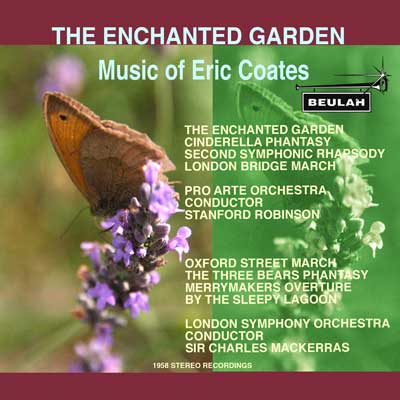 Beulah
have already given us some older recordings of the music of
Eric Coates, conducted by Sir Henry Wood on a 2-CD set, 3PD13,
with music by Vaughan Williams, Elgar and Purcell � see February
2011 Roundup.
The recorded sound there is little more than tolerable, whereas
in the present case it still sounds agreeably fresh.
Beulah
have already given us some older recordings of the music of
Eric Coates, conducted by Sir Henry Wood on a 2-CD set, 3PD13,
with music by Vaughan Williams, Elgar and Purcell � see February
2011 Roundup.
The recorded sound there is little more than tolerable, whereas
in the present case it still sounds agreeably fresh.
Coates wrote some of the most accomplished light music that
I know; music like the Knightsbridge March and Calling
all Workers are strong favourites with the elderly patients
whom I visit in my local hospital, not just because they remember
them as theme tunes; but they also go down well with their young
carers. My favourite recordings come from a 2-CD EMI Classics
for Pleasure set which has been around in various formats for
quite some time (3523562, around £7.00 on disc
or £4.99 as an mp3 download from sainburysentertainment.co.uk).
The splendid performances there are led by Sir Charles Groves,
Reginald Kilbey and Sir Charles Mackerras � my only reservation
about the Beulah reissue is that you will be duplicating three
of the Mackerras items from that set, a set which, if you don’t
already possess, you will want to. They sound just as well here
as they do on CfP.
The Stanford Robinson items come from a Pye recording of about
the same vintage, later reissued on Golden Guinea. The music
and the performances are just as enjoyable as the more familiar
Mackerras items, with none of the surface noise that I remember
from Golden Guinea. Though briefly available on CD from PRT
with less than ideal documentation, their reissue by Beulah
is very welcome, albeit with even less information.
There is also a fine recording of the music of Eric Coates from
what may seem an unlikely source, the Czecho-Slovak RSO and
Adrian Leaper (Marco Polo 8.223445 � see December 2010
Roundup).
It’s no longer available on CD � pending reissue on Naxos?
� but it can be downloaded from classicsonline.com
or streamed from Naxos Music Library.
Bargain
of the Month
Krzysztof PENDERECKI (b.1933)
Complete Cello Concertos
Cello Concerto No.1 (1966-72) [17:49]
Cello Concerto No.2 (1982) [35:15]
Cello Concerto (variant of Viola Concerto, 1983) [20:25]
Art Noras (cello)
Sinfonia Varsova/Krzysztof Penderecki � rec. c.2000. DDD.
WARNER FINLANDIA ELATUS 809274959362 or 685738557561
[73:28] � no longer available on CD in UK? Download from sainsburysentertainment.co.uk
(mp3) or stream from Naxos Music Library
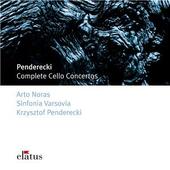 At
£1.79 for a recording now available only as a download
� which, with many providers means an increased price � this
is a surprising bargain. (Sainburys.co.uk also have a download
of the original 2001 release for the same price.) There are
no notes, but that’s also true of the Naxos Music Library
version* and its download partner from classicsonline.com, where
the cost is £6.99. As with Penderecki’s Music
for Cellos and Orchestra (Naxos 8.570529 � see my
review)
this is not music which yields itself easily. Some of it is
outside my comfort zone, but it is worth persevering and these
are ideal recordings from which to get to know it, unless you
prefer to have the 1983 concerto played on the viola, as originally
intended (Naxos 8.572211 � see review)
though the alternative use of the cello was sanctioned by the
composer.
At
£1.79 for a recording now available only as a download
� which, with many providers means an increased price � this
is a surprising bargain. (Sainburys.co.uk also have a download
of the original 2001 release for the same price.) There are
no notes, but that’s also true of the Naxos Music Library
version* and its download partner from classicsonline.com, where
the cost is £6.99. As with Penderecki’s Music
for Cellos and Orchestra (Naxos 8.570529 � see my
review)
this is not music which yields itself easily. Some of it is
outside my comfort zone, but it is worth persevering and these
are ideal recordings from which to get to know it, unless you
prefer to have the 1983 concerto played on the viola, as originally
intended (Naxos 8.572211 � see review)
though the alternative use of the cello was sanctioned by the
composer.
* subscribers to NML will find notes on Concerto No.2 here.
The Open
Goldberg Variations Project
My thanks to Stan Metzger, who runs our sister site Seen and
Heard, for information about the Open Goldberg Variations Project.
There’s a printable new edition of Bach’s Goldberg
Variations, with an iPad app, and free downloads in various
formats (mp3, 24/44.1 wma and 24/96 flac) of a performance by
Kimiko Ishizaka; details in Stan’s recent write-up � here
� where you will find a hyperlink to the project.
Naxos Music
Library
You may have noticed that I refer quite frequently to the Naxos
Music Library in reviews � it’s an invaluable tool for
deciding which downloads to request to review; almost everything
that’s available to download from classicsonline.com is
there and sometimes items are available there for streaming
before they are available for download. We don’t always
remember to mention it, so much do we take it for granted; it
should be an equally invaluable tool for readers wishing to
decide for themselves what to purchase. I’m not here to
publicise NML � or purchases from MusicWeb International for
that matter � but a subscription to the Library is well worth
considering.
Music on
CRD
The re-emergence of the wider availability of recordings from
CRD, both on CD and as downloads provides a good moment to remind
readers of recordings from this stable that I’ve recommended
and to add a few more.
Anton ARENSKY Piano Trio
in d; Nikolai RIMSKY-KORSAKOV
Trio in B-flat
The Nash Ensemble
CRD3409 � see April 2009 Roundup.
See also comparison of this and other recordings of the Arensky
with my review
of both Arensky Piano Trios on TUDOR CD7152.
William BOYCE (1711-1779) Select
Anthems
O Where shall Wisdom be Found? [8:49]
Wherewithal Shall a Young Man [5:42]
I Have surely built Thee an House [9:14]
Voluntary No. 4 in g minor [4:17]
O Praise the Lord [7:56]
Turn Thee unto Me [6:14]
O Give Thanks unto the Lord, for He is Gracious [10:07]
Voluntary No. 1 in D [3:47]
By the Waters of Babylon [8:11]
The Lord is King be the People never so impatient [6:50]
Voluntary No. 7 in C [3:00]
Gary Cooper (organ); New College Choir, Oxford/Edward Higginbottom
� rec. c.1991. DDD
CRD3483 [74:07] � from classicsonline.com
(mp3) or stream from Naxos Music Library
 If
you know Boyce at all, it may be through his Eight Symphonys
[sic], but his impressive choral output has received less attention.
Ignore the stolid image presented on the cover and listen to
the opening Where shall wisdom be found? and you will
find that in this case it’s not ut pictura musica;
the picture doesn’t represent the music. The performances
could hardly be bettered and the recording does them justice.
Only the lack of texts here and in the other New College recordings
makes me hesitate to prefer the download to the physical album
� just the back cover of the CD with its list of contents in
this case; not even that for some of the others.
If
you know Boyce at all, it may be through his Eight Symphonys
[sic], but his impressive choral output has received less attention.
Ignore the stolid image presented on the cover and listen to
the opening Where shall wisdom be found? and you will
find that in this case it’s not ut pictura musica;
the picture doesn’t represent the music. The performances
could hardly be bettered and the recording does them justice.
Only the lack of texts here and in the other New College recordings
makes me hesitate to prefer the download to the physical album
� just the back cover of the CD with its list of contents in
this case; not even that for some of the others.
William BYRD Cantiones Sacræ
(1575)
New College Choir, Oxford/ Edward Higginbottom
CRD3492 � All three albums � this and the two listed
below � in January 2009 Roundup.
See also references to this album in review of recording of
all Byrd’s and Tallis’s contributions to the 1575
Cantiones (Alamire/Skinner, OBSIDIAN OBSID-CD706) in
March 2011/2 Roundup.
William BYRD Cantiones Sacræ
(1589/1591)
New College Choir, Oxford/Edward Higginbottom
CRD3420/CRD3439 � See CRD3492 above.
William CROFT Select Anthems
O Lord God of My Salvation
We Will Rejoice In Thy Salvation
O Lord I Will Praise Thee
Voluntary in a minor for Double Organ
Hear My Prayer
God Is Gone Up With a Merry Noise
I Will Sing Unto the Lord
Organ Voluntary in D
We Wait For Thy Loving Kindness
O Lord Rebuke Me Not
Timothy Morris (organ)
New College Choir, Oxford/Edward Higginbottom
CRD3491 � see January 2009 Roundup.
Download from classicsonline.com
(mp3) or stream from Naxos Music Library.
This collection can neatly be supplemented with Croft’s
Te Deum, Jubilate and Burial Service from
St Paul’s on budget-price HYPERION HELIOS CDH55252 �
see Hyperion Top 30 Roundup.
Gabriel FAURÉ Piano Quartets
The Nash Ensemble
CRD3493 � see October 2008 Roundup;
download from classicsonline.com
(mp3) or stream from Naxos Music Library.
Be aware, however, of the very special recording of this music
by Domus (HYPERION CDA66166 � see Hyperion Top 30 Roundup).
Classicsonline.com now charge £7.99 for CRD downloads,
so the Hyperion is actually less expensive and comes in mp3
and lossless, with pdf booklet, for the same price.
Maurice GREENE (1696-1755) Select
Anthems
Lord, let me know mine end [6:14]
The king shall rejoice [11:31]
How long wilt thou forget me, O Lord, for ever? [7:46]
Voluntary in G [5:52]
God is our hope and strength [8:19]
Have mercy upon me, O God [11:50]
12 Voluntarys: Voluntary No. 11 in b minor [4:00]
Let God arise [8:27]
O clap your hands together [3:28]
Thou visitest the Earth [2:14]
Gary Cooper (organ); New College Choir, Oxford/Edward Higginbottom
� rec. c.1991. DDD
CRD3484 [69:41] � from classicsonline.com
(mp3) or stream from Naxos Music Library
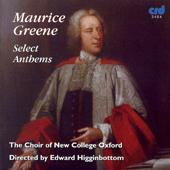 The
music of Maurice Greene undoubtedly suffered and still suffers
from comparison with that of his contemporary, Handel. His style
is certainly restrained and scholarly by comparison, so the
portrait of him wearing his D.Mus. gown on the cover of the
CRD album is appropriate. And yet … Hyperion coupled one
of his longer anthems, Hearken unto me ye holy children,
with Handel’s Choice of Hercules (CDA67298,
King’s Consort) without there seeming to be a huge dichotomy
between them. Reviewing another performance of Hercules
on a budget Virgin twofer � here
� I thought that Hyperion’s inclusion of the Greene anthem
helped set right a historical wrong and re-hearing this CRD
anthology has strengthened that opinion, especially as the New
College performers get the tone just right and the recording
is good. Scholarly Greene may have been, but not po-faced, as
this performance of Let God arise (tr.8) amply demonstrates.
The
music of Maurice Greene undoubtedly suffered and still suffers
from comparison with that of his contemporary, Handel. His style
is certainly restrained and scholarly by comparison, so the
portrait of him wearing his D.Mus. gown on the cover of the
CRD album is appropriate. And yet … Hyperion coupled one
of his longer anthems, Hearken unto me ye holy children,
with Handel’s Choice of Hercules (CDA67298,
King’s Consort) without there seeming to be a huge dichotomy
between them. Reviewing another performance of Hercules
on a budget Virgin twofer � here
� I thought that Hyperion’s inclusion of the Greene anthem
helped set right a historical wrong and re-hearing this CRD
anthology has strengthened that opinion, especially as the New
College performers get the tone just right and the recording
is good. Scholarly Greene may have been, but not po-faced, as
this performance of Let God arise (tr.8) amply demonstrates.
These performances of the music of Croft and Greene are also
contained in an inexpensive 5-CD anthology, The Restoration
and Georgian Anthem, CRD5009.
Johann Adolf HASSE (1699-1783)
Cantatas, ballads and sonatas
Quel vago seno, o Fille [19:23]
Trio Sonata, Op.2/4 [8:56]
La conversione di Sant’Agostino: Ah Dio, ritornate
[7:35]
Fille, dolce mio bene [13:28]
Harpsichord Sonata in E-flat, Op. 7 [14:24]
Venetian Ballads [9:23]
Julianne Baird (soprano), Nancy Hadden (flute), Erin Headley
(viola da gamba), Malcom Proud (harpsichord) � rec. c.1994.
DDD.
CRD3488 [74:53] � from classicsonline.com
(mp3) or stream from Naxos Music Library
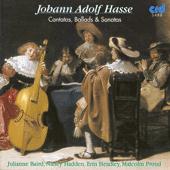 Born
in Germany, Hasse travelled to Italy in 1722 where his music
became very popular, especially his settings of texts by his
friend Metastasio. He’s an important enough figure to have
an online project dedicated to him, though the list of his works
there is as yet incomplete: http://www.hasseproject.com/
Apart from the recordings which I mention below, there isn’t
much of his music in the catalogue � mostly odd items on recital
recordings � so the renewed availability of this CRD recording
with its stylish and attractive performances is very welcome
� apart, that is, from the lack of texts.
Born
in Germany, Hasse travelled to Italy in 1722 where his music
became very popular, especially his settings of texts by his
friend Metastasio. He’s an important enough figure to have
an online project dedicated to him, though the list of his works
there is as yet incomplete: http://www.hasseproject.com/
Apart from the recordings which I mention below, there isn’t
much of his music in the catalogue � mostly odd items on recital
recordings � so the renewed availability of this CRD recording
with its stylish and attractive performances is very welcome
� apart, that is, from the lack of texts.
See also reviews of recordings of Hasse, excerpts from Didone
abbandonata and other works, on Hyperion and Oehms in the
June 2012/2 Roundup.
Herbert HOWELLS A spotless Rose;
Missa Ædis Christi, etc.
New College Choir, Oxford/Edward Higginbottom
CRD3455 [63:02] � from classicsonline.com
(mp3) or stream from Naxos Music Library
See June 2011/2 Roundup,
but ignore link to passionato.com.
Wolfgang Amadeus MOZART String
Quartets Nos. 20-21; 22-23
Chilingirian Quartet
CRD3427 [51:37] � from classicsonline.com
(mp3); CRD3428 [51:31] � from classicsonline.com
(mp3) or stream from Naxos Music Library
See comparative review
with Juilliard String Quartet.
Music from the Spanish Kingdoms
Circa 1500/Nancy Hadden
CRD3447 � see September 2012/1 Roundup
New Fashions: Cries and Ballads of London
Anon. Nutmeg and Ginger; Grimstock; Greensleeves; The
Queen’s almaine; Sellingers rownde
William COBBOLD New Fashions
John DOWLAND Fine knacks
for ladies
Jakob van EYCK Engels
nachtegaeltje
Alfonso FERRABOSCO II Pavin
for 3 lyra viols
Thomas FORD Cate of Bardy
Antony HOLBORNE The voyce
of the ghost
Old almaine
Thomas RAVENSCROFT New Oysters;
Three blind mice; A Round of three country dances in one; Well
fare the nightingale; Come, follow me; Browning
Christopher TYE In nomine
XIX Crye
Thomas WEELKES The Cries
of London
Clement WOODCOCK Browning
my dear
Circa 1500; Red Byrd/Nancy Hadden � rec. c.1993. DDD.
CRD3487 [66:21] � from classicsonline.com
(mp3) or stream from Naxos Music Library

This collection of the popular music of London from the 16th
and 17th centuries, set by the likes of Dowland, Weelkes and
Ravenscroft, may not have the artistic merit of Circa 1500’s
Music from the Spanish Kingdoms (above), but it receives
a suitably lively set of performances here. This CRD recording
makes a good substitute for a recording of Weelkes’ Cries
of London which used to be available from the Deller Consort
(Harmonia Mundi HMA190219); the Dellers are a little
too polite by comparison with Circa 1500 but I could wish that
their recording of Thomas Tomkins’ spoof on the genre,
Oyez! Has any found a lad? were still available.
Henry PURCELL (1659-1695) Verse
Anthems
My heart is inditing, Z30 [18:37]
O sing unto the Lord, Z44 [12:34]
Rejoice in the Lord alway (‘The Bell Anthem’), Z49
[8:52]
Voluntary in d minor, Z719 [5:49]
Praise the Lord, O Jerusalem, Z46 [8:01]
My beloved spake, Z28 [10:49]
The Band of Instruments
New College Choir, Oxford/Edward Higginbottom
No texts.
CRD3504 [64:40] � from classicsonline.com
(mp3) or stream from Naxos Music Library: see February 2009
Roundup.
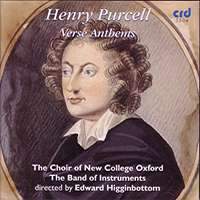 There’s
formidable competition here not least from the Hyperion complete
Anthems and Services of Purcell (CDS44141/51,
11 CDs) � excerpts from this invaluable series and the equally
outstanding Odes and Welcome Songs on Essential Purcell,
a budget-price sampler (KING2).
The downloads of individual volumes from the Anthems and Services
are discounted to £3.50 and £4.00 at the time of
writing. To these the New College recording makes a fine alternative
or addition, preferably the latter, since there’s a good
case for hearing the music performed by both a college choir
and a professional group. The classicsonline.com download is
only a little more expensive than the emusic.com version which
I recommended in 2009 but it sounds better because it comes
at the full bit-rate.
There’s
formidable competition here not least from the Hyperion complete
Anthems and Services of Purcell (CDS44141/51,
11 CDs) � excerpts from this invaluable series and the equally
outstanding Odes and Welcome Songs on Essential Purcell,
a budget-price sampler (KING2).
The downloads of individual volumes from the Anthems and Services
are discounted to £3.50 and £4.00 at the time of
writing. To these the New College recording makes a fine alternative
or addition, preferably the latter, since there’s a good
case for hearing the music performed by both a college choir
and a professional group. The classicsonline.com download is
only a little more expensive than the emusic.com version which
I recommended in 2009 but it sounds better because it comes
at the full bit-rate.
The 2-CD collection from Christ Church Cathedral Choir and Simon
Preston on DG 459 4872 (£7.49 from hmvdigital.com,
mp3) could also be considered as an additional purchase rather
than an alternative to the CRD, as there are very few overlapping
items. Classicsonline.com also have the King’s/Leonhardt
collection from Teldec � here
� but at £6.99 it’s a shade more expensive than some
dealers charge for the Warner Apex CD. Try it from Naxos Music
Library.
Sacred Concerti
Johann Hermann SCHEIN (1586-1630)
Siehe das ist mein Knecht [6:17]
Uns is ein kind geboren [4:57]
Also heilig ist der Tag [5:03]
Tobias MICHAEL (1592-1657)
Wo der Herr nicht das Haus bawet [7:03]
Kommet her zu mir [5:32]
Das ist ein kostlich ding [3:01]
Wie lieblich sind auff den Bergen [8:07]
Heinrich SCHÜTZ (1585-1672)
Anima mea liquefacta est [8:30]
Siehe wie fein und lieblich ist’s [6:59]
Matthaeus REYMANN (c.1540-1602)
Fantasia for solo lute; Preludium 1 [1:31]
Heinrich SCHEIDEMANN (1595-1663)
O Got, wir danken deiner Güt [2:55]
Herzlich lieb hab ich dich [2:27]
Emily Van Evera (soprano); Esther Levin (soprano); Angus Davidson
(alto); Julian Podger (tenor); Ian Honeyman (tenor); Richard
Wistreich (bass)
Circa 1500 (Nancy Hadden (renaissance flute); Catherine Mackintosh
(violin); Elizabeth Walker (flute, recorder); Sally Holman (dulcian);
Susan Addison (alto sackbut); Emily White (tenor sackbut); Lucas
Harris (lute, theorbo); Robert Howard (organ))/Nancy Hadden
� rec. 2007. DDD
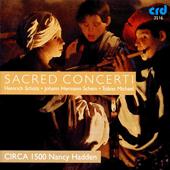 CRD3516
[75:34] � from classicsonline.com
(mp3) or stream from Naxos Music Library: see review
by Gary Higginson
CRD3516
[75:34] � from classicsonline.com
(mp3) or stream from Naxos Music Library: see review
by Gary Higginson
Schütz and Schein are reasonably well represented on record,
but the other composers here are far less so � in fact, I have
to admit that I don’t recall hearing anything from any
of them, so the programme is especially welcome. As with the
New Fashions recording, the title of Circa 1500 is a
century out, but the performances are idiomatic and well recorded.
Only the lack of texts militates against the download when the
parent CD is only a little more expensive.
Josef SUK (1874-1935) String
Quartets Nos. 1 and 2, Balada; String Quartet in d minor,
Suite, Op.21; Variations on an old Bohemian chorale.
The Suk Quartet � rec. c.1994. DDD.
 CRD3472
[72:19] � from classicsonline.com
(mp3) or stream from Naxos Music Library
CRD3472
[72:19] � from classicsonline.com
(mp3) or stream from Naxos Music Library
Dan Morgan and I have expressed some reservations about various
recent recordings of Suk’s music in these roundups, but
in recommending this and the Hyperion Helios reissue of the
Piano Quartet and Quintet (below) I have no hesitation. This
recording deserves all the stars, rosettes and keys with which
it’s festooned in the Penguin Guide; it looks like overkill,
but it’s perfectly justified.
Thomas TALLIS (c.1505-1585)
Cantiones sacræ and other works
Dum transisset sabbatum [6:22]
In ieiunio et fletu [4:43]
Derelinquat impius [2:59]
Magnificat; Nunc Dimittis [13:32]
Candidi facti sunt [4:36]
Salvator mundi [1:52]
Absterge, Domine [5:04]
Gaude gloriosa [16:48]
New College Choir, Oxford/Edward Higginbottom
CRD3429 [55:56] � from classicsonline.com
(mp3) or stream from Naxos Music Library

Whatever other recordings of the music of Tallis you may have,
from the Tallis Scholars on Gimell, Winchester Cathedral and
The Cardinall’s Musick on Hyperion, Alamire’s 2-CD
recording of Byrd and Tallis’s 1575 Cantiones sacræ,
or even the complete 9-disc recording from Chapelle du Roi on
Signum, this album from New College Choir makes an excellent
supplement or even a short introduction to his music for those
who don’t yet know it well. The lack of texts and translations
is a problem, but a little online search should find them.
Thomas TOMKINS Third Service,
Voluntaries and Anthems
New College Choir, Oxford/Edward Higginbottom
CRD3467 [60:33] � from classicsonline.com
(mp3) or stream from Naxos Music Library. See January 2009 Roundup.
There’s also an attractive collection, The Glory of
New College, selected from these and other CRD recordings,
on a budget 2-CD set from Regis, RRC2091 � see December
2010 Roundup.
There are also two inexpensive 5-CD sets, Choral Masterpieces
of the European Renaissance (CRD5008, around £22)
and The Renaissance Anthem in England (CRD5007,
around £26).
There’s another sampler from the New College CRD recordings
on the Heritage label, Oxford Anthems, HTGCD217
� see August 2011/2 Roundup
New College Choir and Edward Higginbottom have also recorded
Nicholas Ludford’s Missa Benedicta and Votive
Anthems for K617 (K617206 � see February 2009 Roundup).
You’ll also find a small but growing number of their recordings
for their own Novum label from eclassical.com, classicsonline.com
and the Naxos Music Library:
� François COUPERIN Motets:
NCR1384 � see March 2012/2 Roundup
and Recording of the Month review
� Wolfgang Amadeus MOZART Requiem:
NCR1383 � see October 2011/2 Roundup
� Evensong at New College Oxford: NCR1379 � see
October 2011/2 Roundup
***
Loyset COMPÈRE
(c1445-1518)
Dictes moy toutes voz pensées [1.50]
Jean MOUTON (before 1459-1522)
Missa Dictes moy toutes voz pensées [38.18]
Quis dabit oculis? (Lament for Anna) [8.35]
Ave Maria … benedicta tu [2.11]
Salva nos, Domine [2.31]
Ave Maria … virgo serena [9.33]
Nesciens mater [4.54]
The Tallis Scholars/Peter Phillips – rec. 2011 (?). DDD.
Pdf booklet with texts and translations included.
GIMELL CDGIM047 [67:54] – from gimell.com
(mp3 and 16– and 24-bit lossless)
 I
signalled that this recording was forthcoming at the end of
the September 2012/2 Roundup - here.
I’ve been playing it almost daily since I first obtained
review access to the download in early August and marvelling
that such a talented composer had disappeared from our ken almost
without trace until Hyperion and the Brabant Ensemble came to
his rescue � July 2012/1 Roundup
� with equally able support now from the Tallis Scholars and
Gimell. I rather used up my superlatives on the Hyperion version
and was trying to express my enjoyment of the Gimell without
having to recycle them; in the event Geoff Molyneux has come
to me rescue and given these detailed responses to both recordings:
I
signalled that this recording was forthcoming at the end of
the September 2012/2 Roundup - here.
I’ve been playing it almost daily since I first obtained
review access to the download in early August and marvelling
that such a talented composer had disappeared from our ken almost
without trace until Hyperion and the Brabant Ensemble came to
his rescue � July 2012/1 Roundup
� with equally able support now from the Tallis Scholars and
Gimell. I rather used up my superlatives on the Hyperion version
and was trying to express my enjoyment of the Gimell without
having to recycle them; in the event Geoff Molyneux has come
to me rescue and given these detailed responses to both recordings:
The CD begins with a three-part chanson by Loyset Compère
which is used by Mouton as the basis for his mass Dictes
moy toutes vos pensées. We know instantly that we
are about to hear a performance and recording of the highest
quality. The Kyrie of the mass unfolds beautifully and
at Christe there is lovely contrast of texture in the disposition
of the voices. The Gloria begins in chordal style, soon
dissolving into complex counterpoint. All sing together again
in homophonic style at tu solus altissimus but Mouton is such
a great contrapuntist that he soon begins to weave yet further
beautifully coloured webs of sound.
In the Credo, following a telling pause before Crucifixus,
there follows more amazing development of material and new colours
created by ever-changing voice combinations. The Sanctus
is in sombre mood and performed more slowly. The deep tones
at the start portray an all-powerful God, but the music of the
Osanna is suitably contrasted with the addition of an
alto, a faster tempo and a lighter texture.
Agnus Dei 1 is given a magnificent and expansive performance
of great depth and colour. Agnus Dei 3 provides a stunning
conclusion to this magnificent work with yet further variations
in counterpoint and texture as well as unexpected dissonance.
This Mass, the Compère chanson and Nesciens mater
are given excellent, but very different performances by the
Gentlemen of St John’s directed by Graham Walker on the
Quilisma label. [QUIL402 � from classicsonline.com (mp3)
or stream from Naxos Music Library. Order CD direct from quilisma.com.]
Firstly all the parts of the mass are taken at a slower speed
by Walker with the exception of the three Agnus Dei. This
more drawn out approach is perhaps more in keeping with the
greater resonance of their location. I prefer the Tallis Scholars
because of their clarity and greater rhythmic life. For example
I like their more solid approach and strong feeling of pulse
as the singers enter at the words et in terra pax hominibus
following the intonation of the Gloria, and similarly
at the outset of Agnus Dei 1.
In Nesciens mater I don’t feel that the voices are
quite so well blended in Walker’s account with the Gentlemen
of St. John’s, and I can hear one or two, admittedly tiny,
lapses in intonation. But this is a minor niggle and it is nevertheless
beautifully sung. The performance by The Tallis Scholars has
a feeling of great stillness and purity. Their superb singing
of Nesciens mater builds to the centre of the piece and
this is followed by a gradual decrease in tension as we approach
the conclusion of the music. Walker just seems a little turgid
after hearing Phillips and the Tallis Scholars.
The Tallis Scholars sing with impeccable intonation � I only
noticed one tiny imperfection � and style throughout this recording.
Their melodic lines soar, seemingly effortlessly with an even-toned,
melodic flow. The recording always displays great clarity in
the voice parts in spite of the complexity of the music, and
the depth of tone and expression is much to be admired.
Geoffrey Molyneux
Jean MOUTON (before 1459-1522)
Missa Tu es Petrus and other works
Nesciens Mater [5:37]
Ave Maria, gemma virginum [2:26]
Exsultet coniubilando [4:13]
Verbum bonum et suave [11:08]
Missa Tu es Petrus* [31:03]
Bona vita, bona refectio [6:11]
Factum est silentium [5:30]
*Helen Ashby (soprano), Kate Ashby (soprano), Emma Ashby (alto),
Alastair Carey (tenor)
The Brabant Ensemble/Stephen Rice – rec. August 2011. DDD.
Pdf booklet with texts and translations available
HYPERION CDA67933 [66:07] – from hyperion-records.co.uk
(mp3, 16� and 24-bit lossless)
[see also review
by Gary Higginbottom and July 2012/1 Roundup]
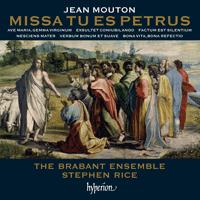 Very
different but equally valid accounts of music by Mouton are
given by the Brabant Ensemble directed by Stephen Rice. There
are two voices, including women’s voices, to a part in
the Mass and the whole approach seems lighter in spirit. There
is a higher tessitura, with the women singing the cantus firmus
high in the 5 part texture. Generally the music is moving along
at a faster pace than we heard on the Gimell recording, with
the exception of Nesciens mater, and this is the only
piece appearing on both recordings. The Brabant Ensemble’s
performance of Nesciens mater is in meditative mood and
is an altogether less intense, softer-toned account than that
given by The Tallis Scholars, but there are some meltingly beautiful
soft passages. The other motets sung here by the Brabants are
also beautifully performed. The recording is more distant and
resonant than the Gimell due to the more open acoustic of the
venue for these performances.
Very
different but equally valid accounts of music by Mouton are
given by the Brabant Ensemble directed by Stephen Rice. There
are two voices, including women’s voices, to a part in
the Mass and the whole approach seems lighter in spirit. There
is a higher tessitura, with the women singing the cantus firmus
high in the 5 part texture. Generally the music is moving along
at a faster pace than we heard on the Gimell recording, with
the exception of Nesciens mater, and this is the only
piece appearing on both recordings. The Brabant Ensemble’s
performance of Nesciens mater is in meditative mood and
is an altogether less intense, softer-toned account than that
given by The Tallis Scholars, but there are some meltingly beautiful
soft passages. The other motets sung here by the Brabants are
also beautifully performed. The recording is more distant and
resonant than the Gimell due to the more open acoustic of the
venue for these performances.
The Kyrie of the mass Tu es Petrus is very free
flowing and quite quick. Sometimes I feel that the conductor
is pushing the music onwards as if afraid the performance will
become too slow. The beautiful quality of the high voices in
the Sanctus and Credo provides a real contrast and a different
sound world from that of the Tallis Scholars. The Brabant Ensemble
allow the music to simply flow along easily and fluently.
It seems amazing that although this music is so complex, it
never seems that way to the listener. It gives the impression
of airiness, lightness and simplicity as it flows gently along
in devotional or meditative mood.
If I had to choose one recording my own personal preference
would be for the Gimell because of the greater clarity of the
counterpoint and fabulous singing of The Tallis Scholars, but
maybe the more diffuse, cathedral-like sound of the Brabant
Ensemble is more authentic. Actually I would not like to be
without either of these excellent and well-contrasted performances;
buy both if funds permit.
Geoffrey Molyneux
Thomas TALLIS (c.1505-1585)
Iam lucis orto sidere (for organ) [1:21]
Fantasy for organ [2:11]
Peter White (organ of St John’s College, Cambridge) � rec.
1960. ADD/stereo
BEULAH EXTRA 2BX197 [1:21] and 1BX197 [2:11] �
from eavb.co.uk
(mp3)
Te Deum a 5 (in English)
Choir of St John’s College, Cambridge/George Guest � rec.
1960. ADD/stereo
BEULAH EXTRA 3BX197 [9:04] � from eavb.co.uk
(mp3)
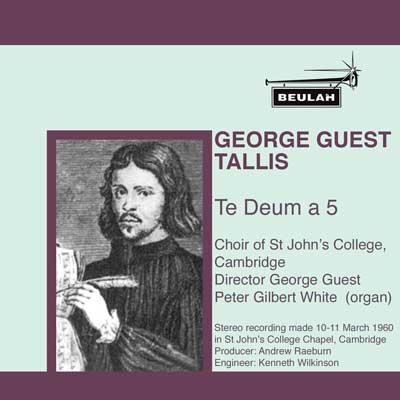 Everything
here is available on a Double Decca set in company with recordings
from King’s (455 2092) but the separate inexpensive
availability from Beulah will be especially welcomed by those
who have the King’s Tallis in an earlier incarnation.
Everything
here is available on a Double Decca set in company with recordings
from King’s (455 2092) but the separate inexpensive
availability from Beulah will be especially welcomed by those
who have the King’s Tallis in an earlier incarnation.
These three recordings were released on Argo ZRG5237 in 1961
and a decade later on the budget Decca Eclipse label, coupled
with more Tallis (two Latin motets) and music by Thomas Weelkes.
Between them Tallis and Byrd, though themselves clinging to
their Roman Catholic beliefs, got the Book of Common Prayer
off to a good musical start with settings of the canticles and
other English texts. The 5-part English Te Deum, also
known as Te Deum for meanes, perhaps composed even before
the first English Prayer Book of 1549, is a fine example of
Tallis’s ability to blend the best of the old style with
the post-reformation demand for less elaboration, essentially
one note per syllable, and this reissue does the music full
justice in a good transfer of a recording which sounds a trifle
dim by comparison with what we have come to expect but is much
more than acceptable. For more modern sound and an equally fine
interpretation, turn to Chapelle du Roi and Alistair Dixon on
Signum SIGCD002 � see October 2008 Roundup.
The short organ pieces make very good appetisers for the main
course. Now may we have the two Latin motets from the original
LP, please?
William BYRD (1543-1623)
The Great Service [42:52]
Praise our Lord, all ye Gentiles [2:46]
Unto the hills mine eyes I lift [4:05]
Make ye joy to God all the earth [2:27]
Turn our captivity [4:25]
This Day Christ was born [2:33]
The Cardinal’s Musick/Andrew Carwood � rec. November 2011.
DDD.
Pdf booklet with texts included.
HYPERION CDA67937 [59:08] � from hyperion-records.co.uk
(mp3, 16� and 24-bit lossless)
 It
was to be expected that The Cardinall’s Musick would follow
up their Latin music of Byrd (ASV and Hyperion), though we already
had several undeniably fine performances of Byrd’s Great
Service, his masterpiece blending polyphony with the requirements
of the Anglican liturgy, one of them from Hyperion who are thus
competing with themselves:
It
was to be expected that The Cardinall’s Musick would follow
up their Latin music of Byrd (ASV and Hyperion), though we already
had several undeniably fine performances of Byrd’s Great
Service, his masterpiece blending polyphony with the requirements
of the Anglican liturgy, one of them from Hyperion who are thus
competing with themselves:
� The Great Service in the Chapel Royal: Steven
Devine (organ); The English Cornett and Sackbut Ensemble and
Musica Contexta � CHANDOS CHAN0789 � see May 2012/2 Roundup
� The Tallis Scholars sing William Byrd: Mass
for five voices; Mass for four voices; Mass for three voices;
Ave verum Corpus; Infelix ego; Tristitia et anxietas; Vigilate
(from Cantiones sacræ 1589); Ne irascaris Domine;
Prevent Us, O Lord; The Great Service; O Lord, make thy servant
Elizabeth; O God, the proud are risen; Sing joyfully: The Tallis
Scholars/Peter Phillips � GIMELL CDGIM208 (2 CDs for
price of one) � see Tallis Scholars at 30 Roundup
� The Great Service; O Lord, make thy servant Elizabeth; Prevent
us, O Lord; Voluntary for my Lady Nevell; How long shall mine
enemies? Out of the deep; Fancy for my Lady Nevell; Christ rising
again from the dead; Sing joyfully: Robert Quinney (organ);
The Choir of Westminster Abbey/James O’Donnell � HYPERION
CDA67533 � see February 2010 Roundup,
mentioned in review of CDA67779.
The Great Service sets the Venite, Te Deum and
Benedictus from Mattins, the Kyries and Creed
from the Communion service and Magnificat and Nunc
Dimittis from Evensong. The Gimell recording omits the short
Kyries and adds three English anthems, O Lord make
thy servant Elizabeth, O God the proud are risen and Sing
joyfully. It stands out by being available with Byrd’s
Latin Masses on a 2-for-1 budget offer; indeed, you may well
have this recording already.
The recent Chandos recording employs instrumental accompaniment
from the English Cornett and Sackbutt Ensemble and is thereby
not strictly comparable with the other recordings; you may have
mixed feelings about the wisdom of the accompaniment, as I did,
and wish to check it out via the Naxos Music Library. Mattins
comes with an introit, Constitues eos, a psalm, No.114,
and ends with the anthem Sing joyfully. Similarly the
Communion settings begin with a Latin introit � perfectly acceptable
within the context of a celebration in the Chapel Royal � and
an instrumental prelude, while Evensong also comes with a Latin
introit, Hodie Simon Petrus, psalm 47, and ends with
an anthem, O Lord make thy servant Elizabeth, the whole
consistent with having been performed on St Peter’s day.
Despite my reservations, this is a worthwhile competitor.
Nor should the Westminster Abbey recording, made by choristers
who regularly sing Byrd’s English and Latin music, under
the very able direction of James O’Donnell, be regarded
other than as highly desirable. This version opens with the
ubiquitous O Lord make thy servant Elizabeth, continues
with the settings for Mattins and Communion, Prevent us O
Lord, an organ Voluntary, How long shall mine enemies, the
two Evensong canticles, Out of the deep, the Eastertide
anthem Christ rising, an organ Fancy and Sing joyfully.
At over 76 minutes, there’s a lot of music here and it’s
performed with a choir containing boys’ voices, as it would
have been at the Chapel Royal, the only version to do so now
that the King’s recording on EMI seems to have disappeared.
The Cardinall’s Musick are, therefore, up against stiff
competition. Completists who have all their earlier recordings
� those on ASV are, happily, beginning to be available again
on CD and download � will jump at the chance to obtain this
recording from a team who have already offered what The Guardian
rightly called a landmark. Wisely Hyperion have chosen to avoid
the English settings which have been included on the other recordings.
Some of these might have been included, however, without making
the recording over-long � in fact it’s rather short value
by current standards, but the reduced selling price for mp3
and 16-bit of £6.99 takes care of that and the 24/44.1
is still very fair value at £7.85. I’ve been listening
to all three versions without instrumental accompaniment and
I really can’t favour one in preference to the others,
so I’ll leave you to decide on the basis of couplings and
whether you must have 24-bit sound, which, I can confirm, sounds
first-class. You can hardly go wrong.
Johann Sebastian BACH (1658-1750)
Goldberg Variations, BWV988
Karl Richter (harpsichord) � rec. 1958 ADD/stereo
BEULAH EXTRA 1BX198 [44:21] - from eavb.co.uk
(mp3)
Jesu, meine Freude, BWV227 (sung in English: Jesu,
priceless treasure)
King’s College Choir, Cambridge/David Willcocks � rec.1959.
ADD/stereo
BEULAH EXTRA 6BX20 [26:49] - from eavb.co.uk
(mp3)
Two classic Bach recordings from Beulah this month.
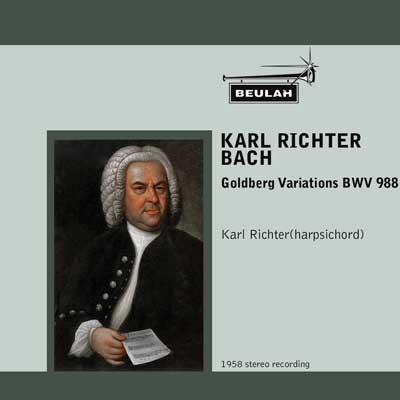 This
was Karl Richter’s first recorded take on the Goldbergs,
for Telefunken (Teldec); he recorded it again in 1970 for DG.
It’s evident from the timings that repeats are ignored
� a playing time of half that of the recent Matthew Halls recording
on Linn � but that was par for the course then. The instrument
is light in tone by comparison with that employed for the later
version, and all the better for it as far as I’m concerned.
The performance is very good � unless you want the repeats or
a piano version, you won’t do much better � and the recording
has been made to sound well in this transfer. Beulah give the
date as 1958, but I rather think that January 1956 is correct.
This
was Karl Richter’s first recorded take on the Goldbergs,
for Telefunken (Teldec); he recorded it again in 1970 for DG.
It’s evident from the timings that repeats are ignored
� a playing time of half that of the recent Matthew Halls recording
on Linn � but that was par for the course then. The instrument
is light in tone by comparison with that employed for the later
version, and all the better for it as far as I’m concerned.
The performance is very good � unless you want the repeats or
a piano version, you won’t do much better � and the recording
has been made to sound well in this transfer. Beulah give the
date as 1958, but I rather think that January 1956 is correct.
Even fans of either of Glenn Gould’s recordings might well
find themselves drawn to this reissue. With neither of Richter’s
recordings of the Goldbergs in the current UK catalogue, this
Beulah release is very welcome, especially as it comes at an
attractive price. Best of all, it may well tempt you to try
some of Karl Richter’s available cantata recordings. (DG
and Warner Teldec).
 The
King’s recording of the motet Jesu, meine Freude,
from Argo ZRG5234, was generally held to be the best available
when it was released in 1960, albeit that it was sung in English.
The performance was rated as masterly, which remains true; for
all that I agree with Organ Morgan in Under Milk Wood about
JSB’s superiority, even over Palestrina, his second choice,
I’m not a great lover of the Bach motets, but David Willcocks
comes as close as anyone to convincing me. The other feature
that placed this recording above its rivals was held to be the
recording balance; again, that remains true insofar as all the
parts are given equal weight, but the sound overall is somewhat
muddy by comparison with more recent recordings. Nevertheless,
with a good transfer, this is a very worthwhile memento of a
golden age at King’s.
The
King’s recording of the motet Jesu, meine Freude,
from Argo ZRG5234, was generally held to be the best available
when it was released in 1960, albeit that it was sung in English.
The performance was rated as masterly, which remains true; for
all that I agree with Organ Morgan in Under Milk Wood about
JSB’s superiority, even over Palestrina, his second choice,
I’m not a great lover of the Bach motets, but David Willcocks
comes as close as anyone to convincing me. The other feature
that placed this recording above its rivals was held to be the
recording balance; again, that remains true insofar as all the
parts are given equal weight, but the sound overall is somewhat
muddy by comparison with more recent recordings. Nevertheless,
with a good transfer, this is a very worthwhile memento of a
golden age at King’s.
Great Haydn Symphonies � The Sturm und Drang Era
Joseph HAYDN (1732-1809)
Symphony No. 43 in E flat Mercury [23:37]
Symphony No. 44 in e minor Mourning [22:56]
Symphony No. 49 in f minor La Passione [21:56]
Symphony No. 52 in c minor [20:50]
Symphony No. 59 in A Fire [17:12]
Symphony No. 64 in A Tempora Mutantur [18:19]
Austro-Hungarian Haydn Orchestra/Adam Fischer
NIMBUS NI7072 [2 CDs] � £12 post free from MusicWeb
International � here.
Joseph HAYDN Symphonies Volume
3, Nos. 40-54
Symphony No. 40 in F [17:17]
Symphony No. 41 in C [18:35]
Symphony No. 42 in D [26:04]
Symphony No. 43 in E flat Mercury [23:37]
Symphony No. 44 in e minor Mourning [22:56]
Symphony No. 45 in f sharp minor Farewell [26:17]
Symphony No. 46 in B [16:56]
Symphony No. 47 in G [20:17]
Symphony No. 48 in C Maria Theresa [26:43]
Symphony No. 49 in f minor La Passione [21:56]
Symphony No. 50 in C In Nomine Domini [17:44]
Symphony No. 51 in B flat [19:19]
Symphony No. 52 in c minor [20:50]
Symphony No. 53 in D The Imperial [22:23]
Symphony No. 54 in G [24:38]
Austro-Hungarian Haydn Orchestra/Adam Fischer
NIMBUS NI5530/34 [5 CDs] � £23 post free from MusicWeb
International � here;
downloads are likely to be more expensive. Stream from Naxos
Music Library.
 The
Sturm und Drang 2-CD set would be an ideal follow-up
purchase for anyone who bought the earlier 2-disc set of Nos.
6, 45, 48, 82, 92 and 94 on NI7041/2 (also £12
from MusicWeb International � here)
which I made Recording of the Month � review.
It’s not available in this form for download, though Volumes
3 and 4 of the complete Haydn Symphonies include its contents
and much more. Those two volumes, five CDs each, are again best
purchased on CD � £23 each, post paid, as against £39.95
each for the download from classicsonline.com. Even better value
is to be had by buying the complete set of 104+ symphonies in
mp3 format (NI1772 � review;
purchase here
� £23 post paid.)
The
Sturm und Drang 2-CD set would be an ideal follow-up
purchase for anyone who bought the earlier 2-disc set of Nos.
6, 45, 48, 82, 92 and 94 on NI7041/2 (also £12
from MusicWeb International � here)
which I made Recording of the Month � review.
It’s not available in this form for download, though Volumes
3 and 4 of the complete Haydn Symphonies include its contents
and much more. Those two volumes, five CDs each, are again best
purchased on CD � £23 each, post paid, as against £39.95
each for the download from classicsonline.com. Even better value
is to be had by buying the complete set of 104+ symphonies in
mp3 format (NI1772 � review;
purchase here
� £23 post paid.)
Franz SCHUBERT (1797-1828)
Grand Duo Sonata in C, D812 (Op. posth. 140) � orchestrated
by Joseph JOACHIM (1855)
Vienna State Opera Orchestra/Felix Prohaska � rec. 1952. ADD/mono
BEULAH EXTRA 1-4BX196 [34:37] � from eavb.co.uk
(mp3)
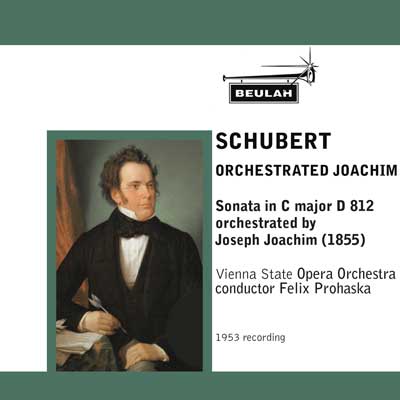 It’s
no longer believed that Grand Duo sonata of 1824/5 was
a reduction of a lost Gastein symphony, though Joachim’s
arrangement of it is still well worth playing and hearing in
this performance, with the VSOO sounding more accomplished than
usual. There’s a modern (1989) recording from Claudio Abbado
on DG, coupled with the Unfinished Symphony (423 6552
� see September 2010 Roundup)*
and that, of course, sounds much better than this Vanguard version
from the early 1950s. Beulah give the recording date as 1953,
but it was first reviewed in 1952. The transfer is thin but
more than acceptable; Naxos Classical Archives have also released
a decent transfer of the Prohaska recording (9.80605),
available from classicsonline.com
in the UK and some other countries (not the USA) for £1.99,
which works out a few pence less expensive than the Beulah reissue,
if you can get it..
It’s
no longer believed that Grand Duo sonata of 1824/5 was
a reduction of a lost Gastein symphony, though Joachim’s
arrangement of it is still well worth playing and hearing in
this performance, with the VSOO sounding more accomplished than
usual. There’s a modern (1989) recording from Claudio Abbado
on DG, coupled with the Unfinished Symphony (423 6552
� see September 2010 Roundup)*
and that, of course, sounds much better than this Vanguard version
from the early 1950s. Beulah give the recording date as 1953,
but it was first reviewed in 1952. The transfer is thin but
more than acceptable; Naxos Classical Archives have also released
a decent transfer of the Prohaska recording (9.80605),
available from classicsonline.com
in the UK and some other countries (not the USA) for £1.99,
which works out a few pence less expensive than the Beulah reissue,
if you can get it..
Beulah have also given us a recording, again with the VSOO,
of Weingartner’s completion of a symphony in E, D729, which
Schubert began and left unfinished � not the so-called Unfinished
of which the last two movements may have been completed and
lost: 1BX188-191 � see May 2012/1 Roundup.
* The Passionato link no longer applies for any recordings:
download from hmvdigital.com.
They also offer Abbado’s complete Schubert symphony cycle
for a very reasonable £11.99 � here.
Johannes BRAHMS (1833-1897)
Violin Concerto in D, Op.77 [40:32]
Double Concerto for Violin and Cello in A minor, Op.102 [31:57]
Julia Fischer (violin); Daniel Müller-Schott (cello) (Double
Concerto)
Netherlands Philharmonic Orchestra Amsterdam/Yakov Kreizberg
� rec. 2005 and 2006. DDD.
Pdf booklet included
PENTATONE PTC5186066 [72:59] � from eclassical.com
(mp3, 16� and 24-bit lossless) or stream from Naxos Music
Library
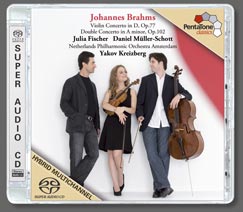 A
very generous coupling of two performances which have won golden
opinions � if, that is, you adopt the conventional view that
the first movement of the Violin Concerto should be predominantly
lyrical to the extent that it borders on the elegiac. I have
to say that I don’t share that opinion � my benchmark remains
the superb combination of Jascha Heifetz and Fritz Reiner who
fairly belt through that movement by comparison with almost
everyone else. They take 18:45 as against 23:16 on PentaTone
� and that actually minimises the difference because Julia Fischer
employs a shorter cadenza. That said, Ms Fischer and Yakov Kreizberg
offer a very good ‘standard’ interpretation and they
are joined in an equally fine account of the Double Concerto
by Daniel Müller-Schott.
A
very generous coupling of two performances which have won golden
opinions � if, that is, you adopt the conventional view that
the first movement of the Violin Concerto should be predominantly
lyrical to the extent that it borders on the elegiac. I have
to say that I don’t share that opinion � my benchmark remains
the superb combination of Jascha Heifetz and Fritz Reiner who
fairly belt through that movement by comparison with almost
everyone else. They take 18:45 as against 23:16 on PentaTone
� and that actually minimises the difference because Julia Fischer
employs a shorter cadenza. That said, Ms Fischer and Yakov Kreizberg
offer a very good ‘standard’ interpretation and they
are joined in an equally fine account of the Double Concerto
by Daniel Müller-Schott.
With good recording, this should please most listeners; fans
of Heifetz will find his recording available in various transfers,
of which the least expensive is from Naxos Classical Archive,
at £1.99 from classicsonline.com or £1.26 from emusic.com.
Purchasers in the USA and some other countries where the Naxos
version is not available will have to choose one of several
Sony/RCA reissues, coupled with the Beethoven or Tchaikovsky
Violin Concerto or the Bruch Scottish Fantasia. Try the
PentaTone from the Naxos Music Library if you share my preference
for a brisker account of the opening movement of the Violin
Concerto.
I should add that Jonathan Woolf took a more critical view of
this recording than most � see review.
Frederick DELIUS (1862-1934)
Brigg Fair (1907) an English Rhapsody, revised and edited
by Sir Thomas BEECHAM, Bart.
[16:00]
Piano Concerto in c minor (early version in three movements)
(1897-1904)* [30:01]
Idylle de printemps, morceau symphonique (1889) [10:18]
Paris, a Nocturne (Song of a Great City) edited by Sir
Thomas BEECHAM, Bart. (1899) [18:43]
Howard Shelley (piano)*
Royal Scottish National Orchestra/Sir Andrew Davis
CHANDOS CHAN10742 [75:35] � from theclassicalshop.net
(mp3 and lossless) or stream from Naxos Music Library
Alternative recording (Piano Concerto):
� Piers Lane (piano); Ulster Orchestra/David Lloyd-Jones (with
IRELAND Piano Concerto) � HYPERION CDA67296 [64:04]
� from hyperion-records.co.uk
(mp3 and lossless) � see review,
review
and Hyperion
at 30
(Brigg Fair):
� English Music � DELIUS, GERMAN, BANTOCK, BAX and BERNERS
� Royal Philharmonic Orchestra/Sir Thomas Beecham � EMI CLASSICS
9099152 [6CDs] � see review,
review
and July 2011/1 Roundup
(Brigg Fair and Paris)
� Bournemouth Symphony Orchestra/Richard Hickox (with Florida
Suite) � EMI CLASSICS BRITISH COMPOSERS SERIES 3705652
[76:02] � see May 2010 Roundup and review.
Passionato.com link no longer applies; download from classicsonline.com
(mp3) or stream from Naxos Music Library
� Royal Liverpool Philharmonic Orchestra/Sir Charles Mackerras
(with Essential Delius) EMI CLASSICS 0842102 [2
CDs: 2:32:49] � especially good value at £2.99 from sainsburysentertainment.co.uk
(mp3) or stream from Naxos Music Library
 It’s
evident from the list of alternatives that there is strong competition
for all the music on this new recording, especially as the Beecham
recording comes at a competitive price as part of a must-have
6-CD set and the Hickox and Mackerras recordings of Paris,
the latter available as part of a most inexpensive 2-CD set,
are also strong recommendations; indeed, I assume that Richard
Hickox had originally been scheduled to conduct this new Chandos
recording.
It’s
evident from the list of alternatives that there is strong competition
for all the music on this new recording, especially as the Beecham
recording comes at a competitive price as part of a must-have
6-CD set and the Hickox and Mackerras recordings of Paris,
the latter available as part of a most inexpensive 2-CD set,
are also strong recommendations; indeed, I assume that Richard
Hickox had originally been scheduled to conduct this new Chandos
recording.
Nevertheless, Sir Andrew Davis makes a strong case for everything
here. From the opening notes it’s clear that this is going
to be an idiomatic and appealing Brigg Fair and the Piano
Concerto could hardly be in the hands of a better soloist than
Howard Shelley. That the work is performed in the 1897 3-movement
edition is of less consequence, since the 1904 version with
Piers Lane as soloist on Hyperion also predates the 1907 revision
and that comes with excellent performances of John Ireland.
If the new Chandos programme appeals, everything is as well
performed and recorded as the earlier release containing the
Violin Concerto and other works. If you already have the Chandos
recording of John Ireland’s Piano Concerto (CHAN8461,
Eric Parkin and Bryden Thomson � see February 2011 Roundup)
and don’t wish to duplicate it with the Hyperion recording,
that’s an even stronger case for the new recording.
One minor disappointment, shared with the new Rózsa recording
(below): the earlier Chandos recording of the Violin Concerto,
was available in both 16-bit and 24-bit lossless sound whereas
the new release is in mp3 and 16-bit only though it was recorded
in 24/96 format.
Richard STRAUSS (1864-1949)
Eine Alpensinfonie, Op. 64 (1915) [52:39]
Symphonische Fantasie aus ‘Die Frau ohne Schatten’
(1947) [23:29]
São Paulo Symphony Orchestra/Frank Shipway
rec. February-March 2012, Sala São Paulo, Brazil
Pdf booklet included
BIS-SACD-1950 [77:04] � from eclassical.com
(mp3, 16� & 24-bit lossless)
 A
former colleague, a music teacher, many years ago, had worked
as a student in a record shop � remember those? One Saturday
a man came in and ordered the latest recording of the Alpine
Symphony, so he tried to engage him in conversation about
the merits of Richard Strauss in general and the symphony in
particular, to which the customer replied that he wasn’t
interested in the music; he’d simply seen the recording
recommended in a hi-fi magazine.
A
former colleague, a music teacher, many years ago, had worked
as a student in a record shop � remember those? One Saturday
a man came in and ordered the latest recording of the Alpine
Symphony, so he tried to engage him in conversation about
the merits of Richard Strauss in general and the symphony in
particular, to which the customer replied that he wasn’t
interested in the music; he’d simply seen the recording
recommended in a hi-fi magazine.
This new recording would meet that customer’s requirements
admirably, especially in its 24-bit version. He’d be particularly
thrilled by the brass but the overall sound stage is very well
integrated too. As for the performance, it’s true that
the São Paolo orchestra is hardly in the same league
as, say, the Dresden Staatskapelle who have the music in their
blood and who recorded the work for EMI with Kempe (below) and
for Sony with Fabio Luisi � review
� or even the Weimar Staatskapelle who recorded it with Antoni
Wit for Naxos � review
(Bargain of the Month) and review.
I actually didn’t think that they made too bad a fist of
the Alpine, though they sometimes make light of the more
colourful viewpoints, so I was a little surprised to see Dan
being considerably more critical than I had been.
If you subscribe to the Naxos Music Library you can compare
the BIS and Naxos recordings for yourself and I would strongly
advise doing so in the light of Dan’s criticism, though
you will have to put up with the short gaps between sections
that both versions of their player introduce. I liked the Naxos
recording when I reviewed it in the November 2008 Roundup, though
I criticised the fact that the sections didn’t play smoothly,
a problem which should be solved by playing from Winamp or from
the new seamless Windows 7 version of the Windows Media Player.
You’ll also find the LSO/Haitink (LSO Live) and SNO/Järvi
(2-for-1 Chandos) recordings in the Naxos Music Library; the
latter is especially good value in offering performances among
the front runners of all four works:
 Eine
Alpensinfonie, Op.64 [49:25]
Eine
Alpensinfonie, Op.64 [49:25]
Tod und Verklärung, Op.24 [24:02]
Ein Heldenleben, Op.40 [46:20]
Don Juan, Op.20 [18:07]
Scottish National Orchestra/Neeme Järvi � rec. 1986 and
1987. DDD.
CHAN10199 [2 CDs: 73:40 + 64:41] � from theclassicalshop.net
(mp3 and lossless) or CHAN7009 � from theclassicalshop.net
(mp3 and lossless).
[For some inexplicable reason, CHAN10100 offers mp3 less
expensively and CHAN7009 offers lossless less expensively.]
This version of the Alpine Symphony is also available
coupled with Four Last Songs (Felicity Lott) on CHAN8557
[60:19] � from theclassicalshop.net
(mp3 @£4.99 and lossless @£7.99).
NB: with so many short tracks where the music is contnuous,
I strongly recommend that you choose the flac version of the
Chandos for download in order to avoid brief drop-outs between
tracks.
With so little of Rudolf Kempe’s classic Strauss with the
Dresden Staatskapelle still extant on CD, it’s good to
see that NML have his excellent 3-CD set of the Alpine Symphony
with Aus Italien, Macbeth and Don Quixote,
as do their partners at classicsonline.com, though it’s
less good news that the latter charge £24.99 for what
was a bargain-price set when available. Testament have reissued
his 1966 Alpine Symphony with Horn Concerto No.1 (Alan
Civil) on SBT1428.
[BW]
Whether it’s a simple trek up a mountain or something more
complex � it could even be both � Strauss’s Alpine Symphony
is a glorious creation. There’s a clutch of truly memorable
recordings, some of which should be available as downloads;
one of the most satisfying is Bernard Haitink’s latest,
with the LSO in radiant form (review).
It’s a climb that’s suited to different temperaments,
ranging from youthful impetuosity to the sagacity that comes
with age. Haitink’s LSO account, measured and lofty, clearly
belongs in the latter category; even the notorious Barbican
acoustic is less problematic than usual.
The São Paulo orchestra, heard most recently at the BBC
Proms under their new chief Marin Alsop, has recorded several
discs for BIS, of which this is the latest. As for the British-born
conductor Frank Shipway, his experience in European concert
halls and opera career over the past 40 years suggests he’s
a solid � if unexciting � choice for this new recording. Then
again, BIS is known for doing things differently, and its advocacy
of less-well-known bands, soloists and repertoire is one of
its strengths. This Brazilian band has certainly benefited from
this interest and exposure. That said, I’ve not warmed
to their earlier efforts; for instance, their Hindemith has
its moments, but their Schmitt � for Chandos � was very disappointing
indeed.
Despite some less than polished playing at their Proms debut
� their ‘New World’ didn’t fare very well � the
OSESP play with great conviction and energy, especially in South
American repertoire. I really don’t want to pigeonhole
them, but I did wonder whether the sheer heft and line of Strauss
� a challenge for even the best orchestras � would prove too
arduous an ascent. As a taster, I opted to start with the symphonic
fantasy on Strauss’s opera Die Frau ohne Schatten,
and was immediately struck by the pleasing warmth and ‘presence’
of their playing. There’s plenty of detail too, and welcome
signs of that echt-Straussian swell.
This is quite encouraging, although anyone who knows Giuseppe
Sinopoli’s forensic � and impassioned � Dresden account
(DG) may find Shipway and his crew are more successful when
it comes to sensual details rather than sweep. Make no mistake,
those big, surging tuttis are pretty impressive � the mighty
cymbal clashes are a knock-out � but this orchestra simply doesn’t
have the unanimous, collective virtuosity that this music demands.
Anything less than highly disciplined and it all sounds tentative
� halting, even � which is not what one wants to hear
in this most sophisticated score.
The OSESP’s shortcomings are fairly major, and they don’t
augur well for the main work. Despite some fine playing, the
atmospheric opening � Night � displays the same rather generalised
attack one hears in the fantasy, and Sunrise is spectacular
but not terribly subtle. As for the brass, they’re splendid
� there’s no sign of the alleged embouchure problems
ascribed to the trombones � and there’s plenty of vigour
as our intrepid climber makes his way through the foothills.
Apparition isn’t tidy though, and the meadows don’t
seem very welcoming; I could go on, but there’s not much
point, as matters don’t improve. True, the summit is reached
in a veritable blaze of sound, but the vicissitudes of the climb
are presented as a curiously random set of events, rather than
a single and seamless musical whole.
The descent is just as spasmodic; Shipway and his band rise
to the big moments only to fall back in the quieter ones. Take
Vision, for example; it has none of the frisson one expects,
the music overdriven and the orchestral image oversized. That’s
fine if you like your Strauss larger than life, but for all
its flamboyant gestures this is a remarkably subtle and nuanced
score that deserves better than it gets here. The organ doesn’t
always make the required impact in this piece either, and that’s
certainly true here.
I daresay this overzealous, under-characterised performance
will appeal to audiophiles and assorted headbangers intent on
showing off their kit or annoying the neighbours, but as a performance
it never gets beyond the foothills.
Not remotely competitive; an uphill struggle.
Dan Morgan
http://twitter.com/mahlerei
Francis POULENC (1899-1963)
Gloria for soprano, chorus and orchestra, FP 177 [23:51]
Maurice RAVEL (1875-1937)
Daphnis et Chloé � symphonie choréographique
[53:18]
Jessica Rivera (soprano)
Chicago Symphony Chorus and Orchestra/Bernard Haitink � rec.
November, 2007. DDD/DSD
CSO RESOUND CSOR901906 [77:09] � from classicsonline.com
(mp3) or stream from Naxos Music Library
[Recording of the Month � see review by Brian
Reinhart.]
Alternative recording (Daphnis et Chloé):
� London Symphony Orchestra/Pierre Monteux � Hallmark
transfer of Daphnis et Chloé alone from hmvdigital.com
(£1.58) [51:41] or Decca Originals E475 7525 with
Rapsodie Espagnole and Pavane pour une Infante défunte
[73:30] from hmvdigital.com
(£4.99) both in 320 kb/s mp3. See review.
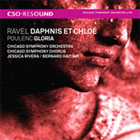 One
of my major loves which I seem to have left out of the reckoning
in these roundup reviews is Ravel’s Daphnis et Chloé,
best heard in the complete score, though the two suites between
them more or less cover the whole work. My commitment to the
classic Monteux recording remains unshaken, ever since I heard
the SXL original from the university record library and later
bought the Ace of Diamonds reissue (SDD170 � one of the last
of my LPs to be disposed of), and it can be yours very inexpensively;
I can’t vouch for the Hallmark transfer, but the short
samples available from hmvdigital.com sound perfectly acceptable.
The Decca Originals recording adds much more music for not much
more money and if it sounds as good as the earlier Decca Classic
Sound reissue which I own on CD the recording is still much
more than acceptable.
One
of my major loves which I seem to have left out of the reckoning
in these roundup reviews is Ravel’s Daphnis et Chloé,
best heard in the complete score, though the two suites between
them more or less cover the whole work. My commitment to the
classic Monteux recording remains unshaken, ever since I heard
the SXL original from the university record library and later
bought the Ace of Diamonds reissue (SDD170 � one of the last
of my LPs to be disposed of), and it can be yours very inexpensively;
I can’t vouch for the Hallmark transfer, but the short
samples available from hmvdigital.com sound perfectly acceptable.
The Decca Originals recording adds much more music for not much
more money and if it sounds as good as the earlier Decca Classic
Sound reissue which I own on CD the recording is still much
more than acceptable.
The CSO recording is obviously superior, even heard from the
Naxos Music Library; there’s even a lossless version from
prestoclassical.co.uk,
and the performance is very little inferior to Monteux’s.
If you prefer the Poulenc coupling to the extra Ravel on the
Decca reissue of Monteux I see no reason why you shouldn’t
be very happy with it, though it’s a little more expensive
than the Decca.
There’s an earlier Haitink recording of Daphnis et Chloé
alone with the LPO on their own label, but that offers rather
short value and reveived rather a lukewarm reception from Karim
Elmahmoudi � here.
Miklós RÓZSA (1907-1995)
Orchestral Works, Volume 3
Concerto for Violin and Orchestra, Op.24 (1953)* [31:22]
Concerto for String Orchestra, Op.17 (1943) [23:55]
Theme, Variations and Finale, Op.13 (1933) [19:27]
Jennifer Pike (violin)*
BBC Philharmonic/Rumon Gamba � rec. December 2011, January and
June 2012. DDD.
Pdf booklet available
CHANDOS CHAN10738 [75:08] � from theclassicalshop.net
(mp3 and lossless)
(Earlier volumes):
� Volume 1 � CHAN10488 � October 2011/1 Roundup
� Volume 2 � CHAN10674 � October 2011/1 Roundup

 Chandos
have been doing sterling service for the music of Miklós
Rózsa and the new recording maintains the good work.
Whether by accident or design, it offers music from three decades,
exactly ten years apart. The Violin Concerto is available on
a Naxos recording which Kevin Sutton � review
� and Derek Warby liked � review
� but the other two works are much rarer beasts.
Chandos
have been doing sterling service for the music of Miklós
Rózsa and the new recording maintains the good work.
Whether by accident or design, it offers music from three decades,
exactly ten years apart. The Violin Concerto is available on
a Naxos recording which Kevin Sutton � review
� and Derek Warby liked � review
� but the other two works are much rarer beasts.
The classic Heifetz recording of the Violin Concerto is available
on Naxos Classical Archives (9.80201 � download only,
not in the USA and several other countries). It comes with a
Spohr Violin Concerto and Tchaikovsky’s Sérénade
mélancolique for just £1.26 or less from emusic.com
or £1.99 from classicsonline.com in a transfer in which
it still sounds very well, making this an unmissable bargain.
By comparison with Heifetz the new recording is a trifle languorous,
but not to the extent that it’s a significant problem,
and the two other Rózsa works make a more satisfying
coupling than the Spohr and Tchaikovsky. Both recordings make
it clear that this is a more substantial work than the Violin
Concerto of Korngold with whom Rózsa is often compared.
One minor disappointment, shared with the new Delius recording
(above): the earlier volumes were available in both 16-bit and
24-bit lossless sound whereas the new release is in mp3 and
16-bit only though it was, of course, recorded in 24/96 format.




 All Nimbus reviews
All Nimbus reviews








